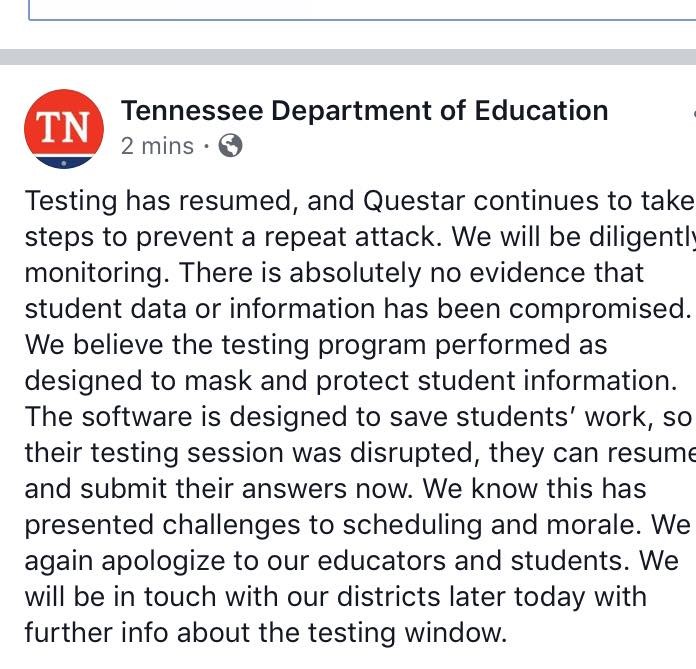Today was Day Three of statewide testing in Tennessee — TNReady. Let’s just say that the first two days didn’t go so well.
After a serious malfunction on Monday, the state’s testing vendor claimed it was hacked yesterday. So, students around the state were unable to complete scheduled tests.
The hacking allegation raises concerns over privacy, and one parent has had enough.
Now, though, the state is sure things are worked out and Day Three is all set — smooth and problem-free.
In fact, Commissioner of Education Candice McQueen testified before a House Committee today and apologized for the two days of problems. She also refused to resign and suggested that because today’s testing was going well, things were back on track. That is, nothing to worry about. She stated she believes the test results can be valid, and can be used in a valid way to evaluate teacher and school performance. Except, even in the best case scenario, that’s wrong.
Here’s the deal: There were scattered reports of issues today, including difficulty logging on and at least five districts requiring some form of tech support. If there had been no other problems this week, that would seem very minor. Taken in context, however, it’s concerning that after these past two days, some districts/schools are still struggling.
I also received one report from a middle Tennessee district that said students in middle grades (5-8) were receiving the wrong grade level tests. While unconfirmed, again, it raises questions in light of earlier challenges this week.
It’s also worth noting that several districts, including two large districts (Williamson, Rutherford) suspended testing for today. That means they weren’t trying to access the system. If the problem the past two days was system overload, a significant reduction in attempts would certainly impact that, possibly allowing the test to go forward today with only minor issues. What will happen tomorrow as those systems join the rest of the state?
Finally, even in systems reporting that the test went smoothly today, here’s what that means at an individual school:
Just a quick update as to where we are on testing and what to expect in the next few days.
We will be on a regular bell schedule both tomorrow and Friday. Due to the number of “Incomplete” tests that did not submit and those that did not get logged on, it has taken a considerable amount of time to get each logged on, trouble shoot and then submit their Writing portion of the test today. We still have close to 97 students to complete tomorrow. Many of these just needed to be recovered and submitted,but this requires time for the administrator to sit with each student and ensure that it does submit successfully.
With that being said, the TDOE has extended the testing window so that we can push back some and get this portion complete prior to moving forward. The Writing portion of the TNReady Test must be submitted prior to being able to move to part 2, 3 and 4 of ELA and has a much earlier required submission date than all of the other tests. We will work tomorrow(Thursday) to get these 97 students caught up and finished and then move ahead to the Math test beginning on Monday as planned. Barring any further disruptions of the testing platform, we will be on our previously announced testing schedule for next week. We will then pick up the remaining ELA testing the following week and will get that information out to you as quickly as we can.
The disruption caused by the testing failures on Monday and Tuesday has far-reaching impact. This message from a principal to parents explains the headache of rearranging schedules and resubmitting the tests.
The bottom line: This year’s online testing may be useful for testing the platform and working out bugs, but it is not a valid indicator of student progress or teacher performance. It certainly shouldn’t be used in any school accountability measures.
Commissioner McQueen seems unfazed by logic, however, and insists we can plow right ahead with these scores and use them to judge teacher performance, and even include them in student grades if a district chooses.
No, the third time wasn’t a charm in Tennessee, no matter what the failed Commissioner says.
For more on education politics and policy in Tennessee, follow @TNEdReport
Creating content takes valuable time — your support helps ensure these stories keep coming.







